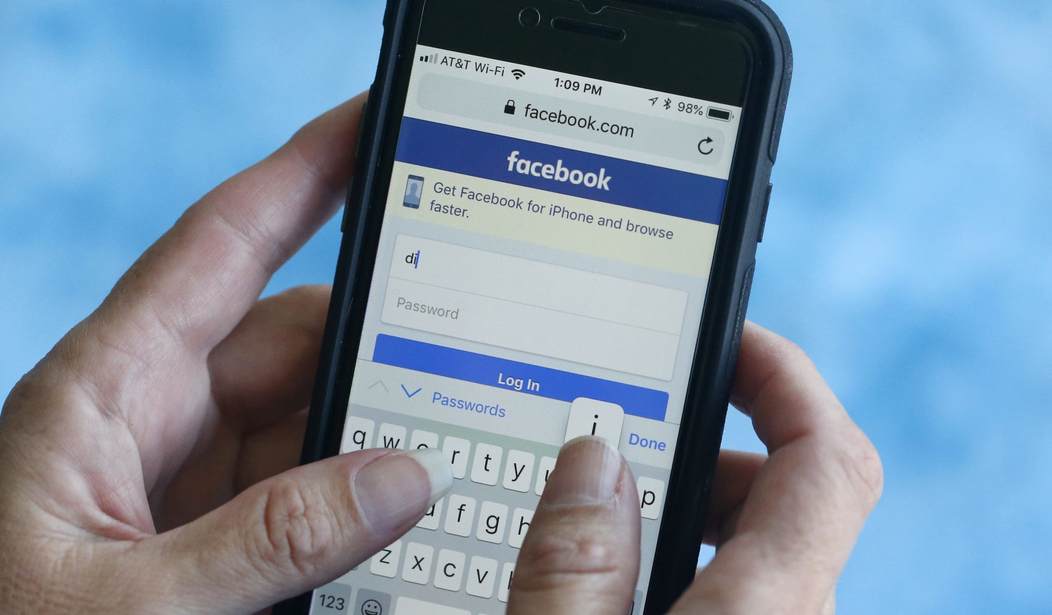Just under two weeks from now, Attorney General Jeff Sessions will meet with state attorneys general (perhaps as many as 24) to discuss legal strategies to curb the immense power of huge technology companies like Facebook and Google. While many social media companies seem to have stifled free speech by suppressing conservative ideas, these companies face direct legal trouble for violating anti-trust and consumer protection laws.
“Today, these social media platforms have created a virtual fence around the free market,” Louisiana Attorney General Jeff Landry told PJ Media. “They’re deciding who comes in, who goes out, what you leave with, and what you don’t.”
With increasing concerns about the power of big tech, some have called for companies like Facebook and Google to be regulated like public utilities. These AGs reject that strategy in favor of a more free market approach.
Anti-trust laws date back to the early 1900s, when President Theodore Roosevelt led the charge to break up monopolistic companies. Landry emphasized the lack of competition Facebook and Google face, suggesting that an anti-trust case against them might be fairly easy to establish.
“When you look at these platforms and whether these platforms in the free market have competition, you find that they don’t,” the AG told PJ Media. “Every day, they grow bigger and bigger, exponentially.”
While Google and Facebook do have competitors in their spheres, the competitors are too small to be anything like a real threat. Facebook claims to have 2 billion users. Google’s basic search function has dominated Internet traffic, to the degree that Yelp — once reliant on Google traffic — filed two legal complaints after the search engine stopped linking to Yelp near the top of results.
When a company has that much power, other questions arise as to whether or not it is abusing its consumers. Landry brought up the issue of personal data. “While all that activity is going on inside the market, they’re collecting data from the consumer and they’re monetizing that data. The consumer doesn’t understand the value their data has,” he explained.
“The amount of data that Google collects from an android phone, the value of that data would enable a consumer to never purchase a phone again or pay another cell phone bill,” Landry argued. While this claim may overstate the value of the data collected, that data certainly carries a much larger value than most consumers suspect.
“What is the consumer getting for that?” the AG asked. “Nothing.”
The issues get even thornier when a company like Facebook engages in partisan censorship of conservative ideas. Just this week, Facebook blocked an article about countering jihad — on the anniversary of the 9/11 attacks!
“Facebook created a virtual public square in which people could exchange ideas,” Landry explained. “But when it didn’t suit some people at Facebook what ideas were being shared, they decided that they were going to suppress that in the name of public safety. That’s not their job — at that point, they become a publisher.”
The AG explained that companies like Facebook “don’t want to be considered publishers because they don’t want liability for what’s posted. Yet they want to monitor content.” This places them in a legal grey area. As a private company, Facebook has free speech rights. But if Facebook is the publisher or “speaker,” then it is no longer the neutral public forum it presents itself as.
In other words, if Facebook says you can post anything on the platform, but then restricts certain ideas, it is lying to its users, and may violate consumer protection laws.
The monopolistic power of companies like Facebook and Google enables the other issues surrounding free speech and consumer protection.
Landry used a concrete analogy to present the situation clearly. “What would have happened if, in 1930 — before there was a TV — if Jeff Landry had become an ink baron, and I had bought up and controlled the manufacturing and supply of 90 percent of the ink used to produce newspapers. All of a sudden I decided I’d start raising the price of my ink,” he said.
“Then I said, ‘I like the Wall Street Journal more than I like The New York Times.’ So I said, ‘New York Times, I’m not selling you any more ink.’ This is exactly the same thing. It’s no different,” Landry argued. “The same fundamentals that allow Facebook or Google to control the free market and to hurt consumers are the same fundamentals that allow them to suppress content.”
The Louisiana AG insisted that these issues are not partisan, and he mentioned three Democrat state attorneys general who have investigated violations by Google and Facebook: Rhode Island’s Peter Kilmartin, Mississippi’s Tim Hood, and Washington state’s Bob Ferguson. Even so, having Jeff Sessions and the U.S. Department of Justice get involved is a powerful game-changer.
“The ability to have the U.S. Department of Justice, which is the 800-point gorilla in the room, is very important in trying to reset the market,” Landry said.
Despite all the concerns he expressed about Facebook and Google, the Louisiana AG insisted, “I don’t think that these companies are inherently evil or that their business model is counterproductive. The problem is when you try to leverage technology to bend the market. That’s what makes America great — we don’t put up with that.”
Jeff Mateer, Texas’ first assistant attorney general, also explained how Facebook and Google might run afoul of anti-trust and consumer protection laws.
“There are growing concerns over the practices of social media platforms, including concerns that conservative and religious voices are being manipulated and/or suppressed,” Mateer told PJ Media. “In evaluating their conduct, we are mindful of both the central tenets of our country’s free market economy and the guaranteed freedom of speech.”
“In working with other state attorneys general, our office is looking into these issues to determine whether any of the companies have violated anti-trust laws and/or engaged in deceptive business practices in violation of state law,” Mateer added. “We must work together to ensure that online economic competition operates fairly and transparently, so that Americans can make informed choices and public discourse can flourish.”
Chris Gacek, a senior fellow at the Family Research Council, compared Facebook’s censorship pattern to an expansive court system. “You have an interior Facebook judicial system, an appellate system, and a Supreme Court of Facebook,” he told PJ Media. “You have basically a bunch of leftists who are in charge of a company and a business model that no one’s ever seen before.”
Gacek laid out the various reasons why social media companies grow into monopolies. “You want all your friends to be on one place,” he explained. Everyone flocks to Facebook because their friends are on Facebook.
Facebook grew to such a level that it bought Instagram and WhatsApp. Google bought YouTube. Twitter bought Periscope.
Gacek noted that trust-busting politicians broke up Standard Oil. A “ruthless politician could say, ‘Google has to give up YouTube’ — that wouldn’t be unreasonable. Facebook could be forced to get rid of Instagram, they could be forced to get rid of WhatsApp.”
Unlike calls to regulate social media companies as public utilities, the anti-trust push would involve long-settled American law and political practice. The state-level investigations may even prove more effective than a big national push.
“The states have much more local level ability to look at what companies are doing, how they interact with consumers,” Gacek noted. “You probably only need five states and you can really mess these guys up.” Sessions has invited no fewer than 24 state AGs to his meeting.
Gacek suggested a “PragerU test” for tech employees, referring to the conservative video nonprofit whose videos have been restricted on Google, refused for promotion on Twitter, and even deleted by Facebook. “How does any sane person have a problem with PragerU?” he asked. “They’re so low-key, it’s not about swearing, it’s all about argument, and the Left can’t take it.”
“Maybe you have the PragerU test — if you think a PragerU video needs to get banned, you’ve gone off the rails.”
Mat Staver, president of Liberty Counsel — a Christian legal nonprofit considering suing the Southern Poverty Law Center (SPLC) for defamation — told PJ Media he had “a telephone conversation this week with a number of attorneys regarding this issue.”
“We’ve actually talked about anti-trust” in regard to social media companies, Staver added. “Even the Department of Justice is talking about anti-trust because of the unfair competition and the monopoly that these companies are wielding, which is far beyond anything that we’ve seen before.”
“I do applaud the Department of Justice, which is convening with a number of state attorneys general to consider going after some of these tech companies,” Staver added.
Social media bias can play a large role in elections. Landry, the Louisiana AG, referenced the recently revealed evidence that Google executives worked to increase Latino turnout in the 2016 presidential election, and lamented when Hillary Clinton lost — suggesting their intent to use Google’s immense power to bolster her campaign against Trump.
“The Russians evidently had nothing on Google,” he quipped.









Join the conversation as a VIP Member